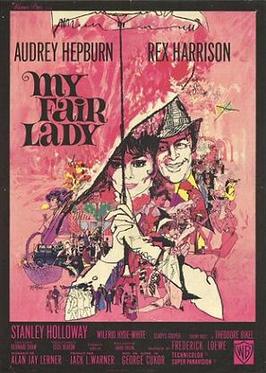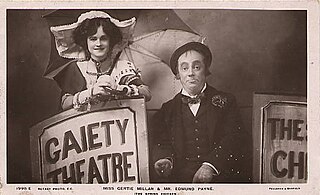
"Jump Jim Crow", often shortened to just "Jim Crow", is a song and dance from 1828 that was done in blackface by white minstrel performer Thomas Dartmouth "Daddy" Rice. The song is speculated to have been taken from Jim Crow, a physically disabled enslaved African-American, who is variously claimed to have lived in St. Louis, Cincinnati, or Pittsburgh. The song became a 19th-century hit and Rice performed it all over the United States as "Daddy Pops Jim Crow".
In poetry, internal rhyme, or middle rhyme, is rhyme that occurs within a single line of verse, or between internal phrases across multiple lines. By contrast, rhyme between line endings is known as end rhyme.

"You're a Grand Old Flag" is an American patriotic march. The song, a spirited march written by George M. Cohan, is a tribute to the U.S. flag. In addition to obvious references to the flag, it incorporates snippets of other popular songs, including one of his own. Cohan wrote it in 1906 for his stage musical George Washington, Jr.
Song structure is the arrangement of a song, and is a part of the songwriting process. It is typically sectional, which uses repeating forms in songs. Common piece-level musical forms for vocal music include bar form, 32-bar form, verse–chorus form, ternary form, strophic form, and the 12-bar blues. Popular music songs traditionally use the same music for each verse or stanza of lyrics. Pop and traditional forms can be used even with songs that have structural differences in melodies. The most common format in modern popular music is introduction (intro), verse, pre-chorus, chorus, verse, pre-chorus, chorus, bridge, and chorus, with an optional outro. In rock music styles, notably heavy metal music, there is usually one or more guitar solos in the song, often found after the middle chorus part. In pop music, there may be a guitar solo, or a solo performed with another instrument such as a synthesizer or a saxophone.
Flanagan and Allen were a British singing and comedy double act most active during the 1930s and 1940s. Its members were Bud Flanagan and Chesney Allen (1894–1982). They were first paired in a Florrie Forde revue, and were booked by Val Parnell to appear at the Holborn Empire in 1929.

"On the Banks of the Wabash, Far Away" is a song written and composed by the American songwriter Paul Dresser in 1897. It is among the best-selling songs of the 19th century, earning over $100,000 from sheet-music revenues. Written and composed by American songwriter Paul Dresser, it was published by the Tin Pan Alley firm of Howley, Haviland and Company in October 1897. The lyrics of the ballad reminisce about life near Dresser's childhood home by the Wabash River in Indiana, United States. The song remained popular for decades, and the Indiana General Assembly adopted it as the official state song on March 14, 1913. The song was the basis for a 1923 film of the same title. Its longtime popularity led to the emergence of several lyrical versions, including an 1898 anti-war song and a Swedish version that was a number-one hit.

"(I'm a) Ramblin' Wreck from Georgia Tech" is the fight song of the Georgia Institute of Technology, better known as Georgia Tech. The composition is based on "Son of a Gambolier", composed by Charles Ives in 1895, the lyrics of which are based on an old English and Scottish drinking song of the same name. It first appeared in print in the 1908 Blueprint, Georgia Tech's yearbook. The song was later sung by the Georgia Tech Glee Club on The Ed Sullivan Show in 1953, and by Richard Nixon and Nikita Khrushchev during the 1959 Kitchen Debate.

San Toy, or The Emperor's Own is a "Chinese" musical comedy in two acts, first performed at Daly's Theatre, London, on 21 October 1899, and ran for 768 performances. The book was written by Edward Morton, and the musical score was written by Sidney Jones with lyrics by Harry Greenbank and Adrian Ross. Additional songs were written by Lionel Monckton. The cast included Marie Tempest, Scott Russell, Huntley Wright and Rutland Barrington.

Cathy Moriarty is an American actress whose career spans five decades. Born and raised in New York City, she made her acting debut opposite Robert De Niro in Martin Scorsese's Raging Bull (1980), for which she received nominations for the Academy Award for Best Supporting Actress, the Golden Globe Award for Best Supporting Actress – Motion Picture, and the British Academy Film Award.

"Mary Jane's Last Dance" is a song written by Tom Petty and recorded by American rock band Tom Petty and the Heartbreakers. It was recorded while Petty was recording his Wildflowers album and was produced by Rick Rubin, guitarist Mike Campbell, and Petty. The sessions would prove to be the last to include drummer Stan Lynch before his eventual departure in 1994. This song was first released as part of the Greatest Hits album in 1993. It rose to No. 14 on the US Billboard Hot 100, becoming Petty's first Billboard top-20 hit of the 1990s, and also topped the Billboard Album Rock Tracks chart for two weeks. Internationally, the song reached No. 2 in Portugal and No. 5 in Canada.
Tyra Shardell Bolling, known professionally as Tyra B, is an American singer, songwriter, and dancer. She is best known for her top 40 R&B singles "Country Boy", "Still in Love" and "Givin' Me a Rush" which is her biggest single to date.

My Fair Lady is a 1964 American musical comedy-drama film adapted from the 1956 Lerner and Loewe stage musical based on George Bernard Shaw's 1913 stage play Pygmalion. With a screenplay by Alan Jay Lerner and directed by George Cukor, the film depicts a poor Cockney flower-seller named Eliza Doolittle who overhears a phonetics professor, Henry Higgins, as he casually wagers that he could teach her to speak English so well she could pass for a duchess in Edwardian London or better yet, from Eliza's viewpoint, secure employment in a flower shop.

"Lily of Laguna" is a British coon song written in eye dialect. It was written in 1896 by English composer Leslie Stuart. It was a music hall favourite, performed notably by blackface performers such as Eugene Stratton and G. H. Elliott. In the early 1940s Ted Fio Rito wrote the tune of a new verse and Paul Francis Webster wrote fresh lyrics and it was stripped of its overtly racist lyrics to become a pure love song which continued to be popular into the 1950s.

The Spring Chicken is an Edwardian musical comedy adapted by George Grossmith, Jr. from Coquin de Printemps (1897) by Jaime and Duval, with music by Ivan Caryll and Lionel Monckton and lyrics by Adrian Ross, Percy Greenbank and Grossmith. The story takes place in Paris and Château de Malmaison.
Charles William Murphy was a prolific British composer of music hall and musical theatre tunes.
Mary Mack is a Scottish folk song, and is also a patter song, often sung not only with a rapid to very rapid tempo but increasing toward the end.

"Cuts Like a Knife" is a song by Canadian rock musician Bryan Adams. It was released in May 1983 as the second single from his third studio album of the same name (1983). It peaked at number 6 on the Billboard Top Rock Tracks chart and number 15 on the Billboard Hot 100. The song has appeared on all of Adams' compilation albums with the exception of The Best of Me.

The Up and Coming Tour was a concert tour by Paul McCartney. The tour began on 28 March 2010, at the Jobing.com Arena in Glendale, Arizona, northwest of Downtown Phoenix. As with McCartney's other concert tours as a solo artist, the setlist for the Up and Coming Tour was composed of songs by his former bands the Beatles and Wings, as well as songs from his solo career. The tour included two concerts at the Hollywood Bowl in Los Angeles, followed by concerts in Miami and San Juan, the latter marking both McCartney's first concert in Puerto Rico and the first visit by a member of the Beatles. The tour ended on 10 June 2011 with a show in Las Vegas, Nevada.

"Ex" is a song by American singer Ty Dolla Sign, released on October 6, 2017. It is the third single from his second studio album Beach House 3 (2017) and features American rapper YG. Produced by BongoByTheWay, Hitmaka and Ty Dolla Sign, the song samples the remix of "Only You" by 112.
William Frederick Bridgen, known professionally as Fred W. Leigh, was an English lyricist who co-wrote several popular music hall songs of the early twentieth century,













